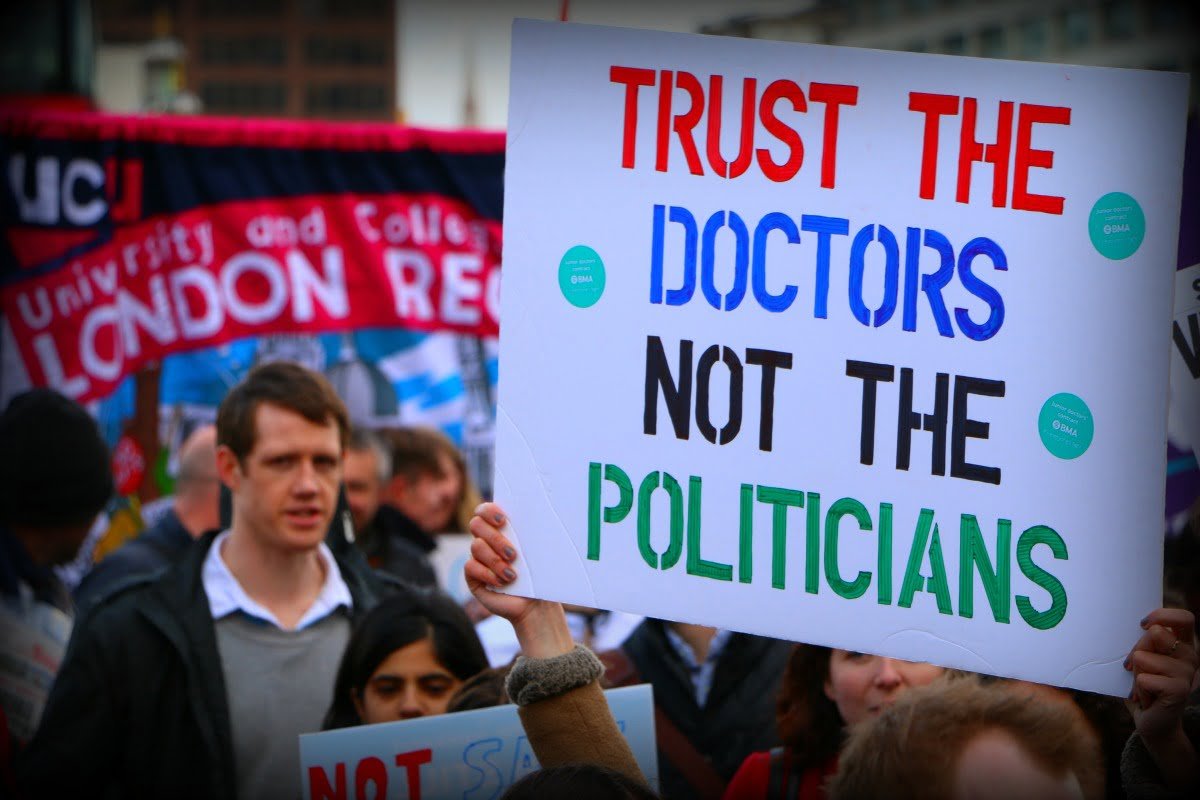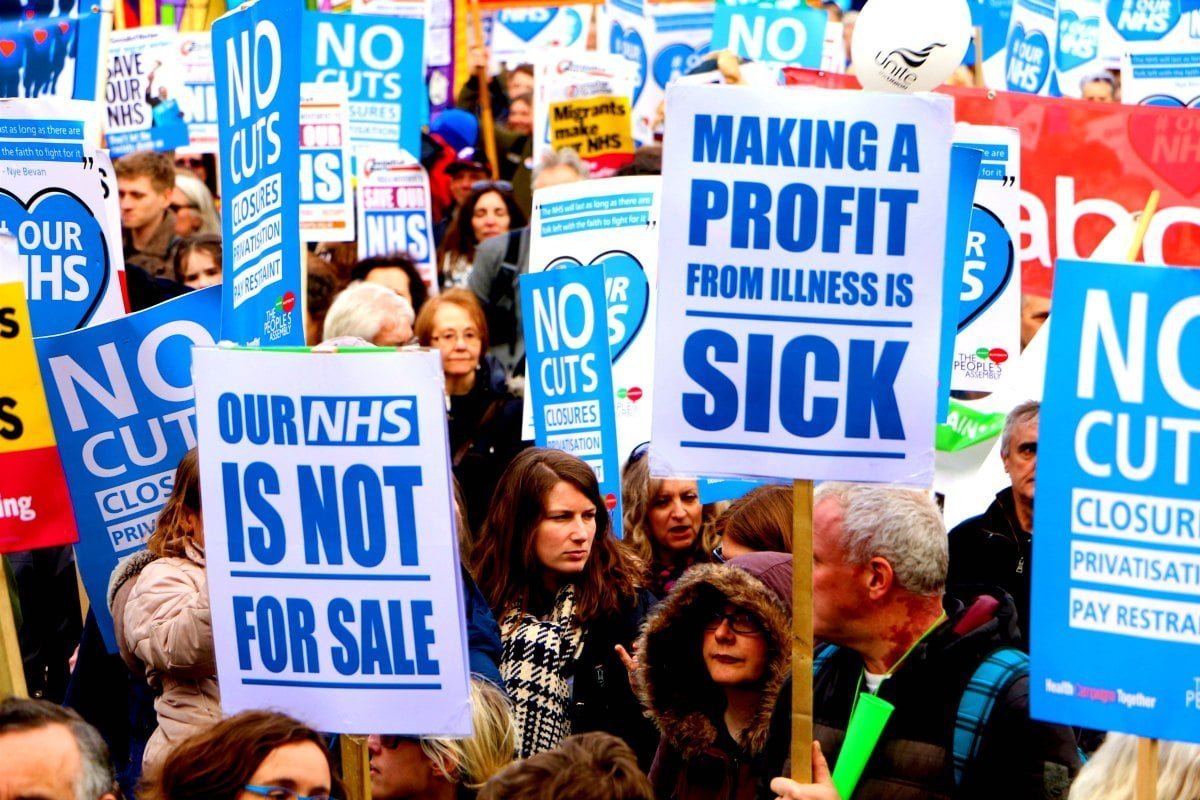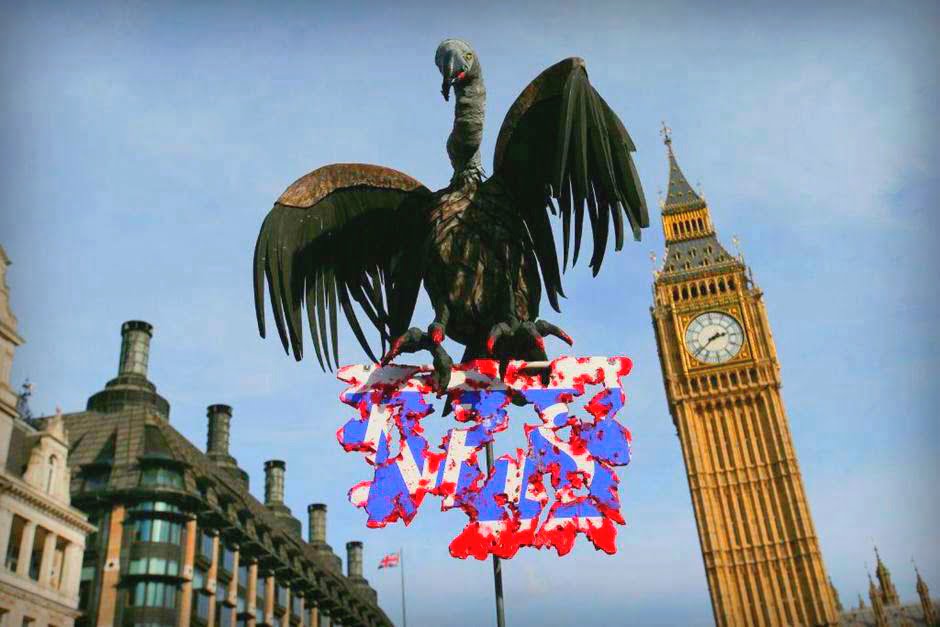The NHS has come under attack from the Tory-led Coalition, with creeping privatisation, major budget cuts and attacks on staff pay and pensions. This weekend’s final leg of the People’s March for the NHS in London showed the widespread anger against these attacks. Scott Leonard of the Sheffield Marxists looks at the future of the NHS under capitalism.
The NHS has come under attack from the Tory-led Coalition, with creeping privatisation, major budget cuts and attacks on staff pay and pensions. This weekend’s final leg of the People’s March for the NHS in London showed the widespread anger against these attacks.
The march has taken place on consecutive days, starting in Jarrow on Saturday 16th August and ending in London on Saturday 6th September, and has attracted much support throughout. This support must be built upon and linked with the wider fight against austerity. Indeed Aneurin Bevan, the Health Minister who founded the NHS, said “the NHS will exist as long as there are folk left with the faith to fight for it”.
Media lies
The NHS has not only been under attack from politicians, but also from the capitalist media. There have been outrageous lies from the media in order to try to undermine public support for the NHS. Hence we are constantly reminded that the health service is ‘inefficient’ and that it is apparently more efficient to have a privatised health service.
This assertion could not be further from the truth, as Britain spends 9.3% of its annual GDP on health care, whilst the USA, with its completely privatised system, spends 17.9% of its GDP, and yet still leaves 48 million Americans without health insurance. The USA’s health care system has, in other words, shown what the free market is capable of providing, with ordinary workers having to decide whether they can afford to go to see a doctor, all while costing almost double what the British system costs.
Another frequent lie is that the NHS is of a poorer quality than other, privatised, health systems. But in a recently report produced by the Commonwealth Fund, it was found that the NHS was not only the best for quality out of 11 other leading countries, but also for access and efficiency. The USA’s privatised system unsurprisingly came last overall.
The diktats of the market

The NHS is currently facing its biggest threat since it came into existence in the form of the Health and Social Care Act and the Transatlantic Trade and Investment Partnership (TTIP). The Health and Social Care Act, among other things, makes the Clinical Commissioning Groups (CCGs) put all contracts for NHS funded work out to tender, on which ‘any qualified provider’ is entitled to tender regardless of whether they are a private sector or public sector provider.
The way that private sector companies can compete with the NHS providers is by tendering at an unrealistically low price and then reduce staff to dangerous levels and by cutting back on the care, with the knowledge that the NHS will bail them out should they fail. As demonstrated by the bailout of the banks, under capitalism, taxpayers will always be forced to pay for the mistakes of the capitalists. Debts are nationalised, whilst profits are privatised. It’s socialism for the rich, capitalist competition for the rest of us.
The Health and Social Care Act also gives the Health Secretary the power to close hospitals without consultation. This clause of the act could quite clearly have serious repercussions for the NHS with such unaccountability.
As previously mentioned, the TTIP is also a great threat to the very existence of the NHS. TTIP is a treaty that is designed to prevent governments from introducing any law that would reduce the profits for multinational businesses – in other words illegalise any attempted reversal of the Health and Social Care Act. The NHS will certainly not be exempted from this, so any attempt at reversal of the NHS counter-reforms would be struck out by an unelected tribunal (“Investor-state dispute settlement”) who could overrule an elected government if it felt that the law would limit the profits of big business. This treaty would spell the beginning of the end for free universal health care as big business would argue to these tribunals that the idea of the state monopoly of the NHS, even when tendered, means that their profits are being limited by the government.
Cuts and PFI
The NHS is also being attacked to the brink of financial ruin through both budget cuts and private finance initiative’s (PFI). The NHS has been forced to make £20 billion of ‘efficiency’ savings – cuts to both staff wages and to patient care. Although the Coalition has trumpeted about the increase in the NHS budget, this has only been increased by the rate of inflation. With the increasing population and the increased cost of drugs from the private drugs companies, the NHS has effectively had severe budget cuts to cope with this. Staff pay has been squeezed and the Health Minister, Jeremy Hunt, even refused to give staff a 1% pay rise recommended by the NHS pay review body, labelling it as “unaffordable”. Strangely enough though, it is not ‘unaffordable’ for MPs to receive a 9% pay rise!
PFI is also financially crippling the NHS. PFI is where a private company pay for a public project and then the public sector pay to lease this equipment or building back but at a huge cost. Indeed it has not been unknown for the overall leasing cost of a PFI project to be 3-4 times what the project is actually worth. The NHS has been forced into these agreements by both Conservative and New Labour governments, and now are crippled by the huge leasing costs of these buildings. Many hospitals that are actually owned by the NHS are either having to be closed or have their budgets severally cut as the NHS is contractually obliged to pay the private capitalist owners of PFI built hospitals the leasing costs. The government still try to claim that PFI projects are more efficient as they are built by the private sector, yet no-one will be fooled by this. How can a project that costs the government 3-4 times more be judged as more efficient?
For a socialist alternative to creeping privatisation

The People’s March for the NHS has at the very least demonstrated how much support there is for the NHS and the opposition to privatisation. From Jarrow to London, people have attended rallies in support of the NHS and have made it clear that the public do not support privatisation of the NHS.
The rally though, is only the starting point. To maintain the NHS and improve our healthcare system, we need to fight for a socialist alternative. Under capitalism, the great reforms of the past are being taken back – as we see happening in the case of the NHS now. Only by putting an end to the system of profit can we guarantee the future of the NHS.
The money exists in society to fund the NHS and put an end to all charges, such as prescription charges and dental charges, but this wealth is concentrated in the hands of a tiny elite. Meanwhile, the NHS can greatly reduce its costs by nationalising the big drugs companies, who make billions by profiteering off patients. Such savings could be spent on better care and better pay for staff.
There must be clear demands for an end to privatisation, linked to the question of the nationalisation of the main levers of the economy, which must be put under democratic control. Health staff, organised throughout the NHS, understand best how to run and provide an efficient health system. In the final analysis, only with a socialist transformation of society and a rational plan of production can we provide the healthcare that we deserve.






